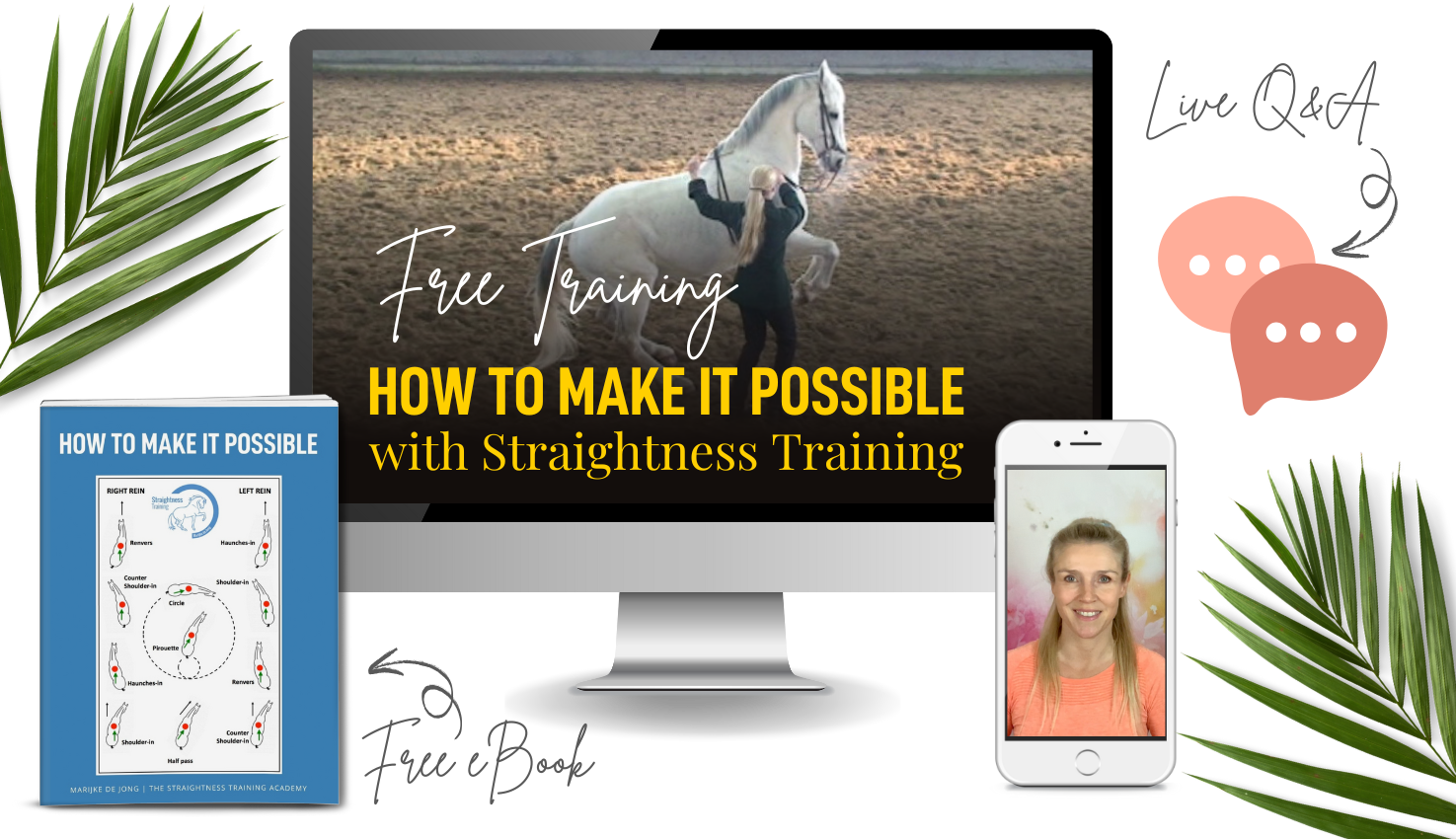- How To Deal With Constructive Criticism?
- 1. Stop Overvaluing Compliments
- 2. Avoid Addiction To Positive Opinions
- 3. Quit Looking For Outside Validation
- 4. Don’t Settle For “Feel Good” Lessons
- 5. Avoid The Extreme, Stay In Green
- 6. Recognize Pure Intentions
- 7. Anticipate and Accept Feedback
- 8. Stay Centered
- 9. Take Responsibility

Crippled By Constructive Criticism? These 9 Strategies May Help
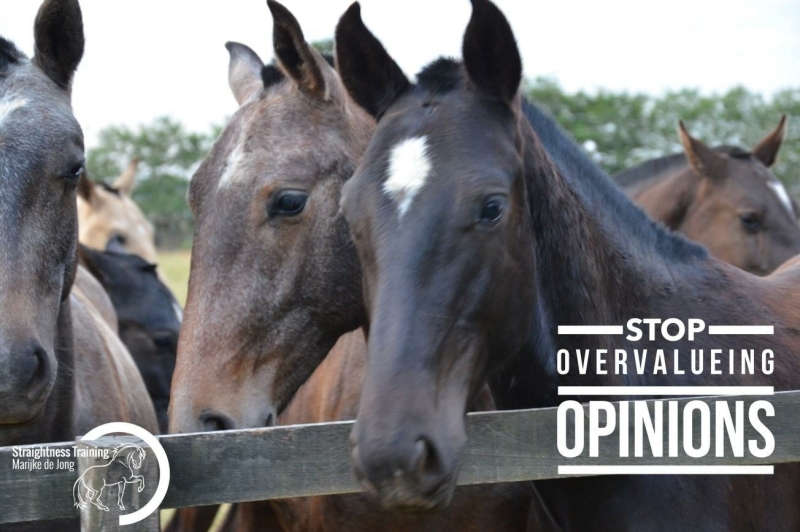
Most riders have opinions:
- “I like your post.”
- “I love your picture.”
- “Wow this method is the best method.”
- “Sad this tool is not okay.”
- “I don’t like this horseman.”
An opinion is a result of our perspective, understanding, values, beliefs, and feelings, and is not always based on facts.
When it comes to people’s opinions, we could define them in the following three categories:
- Positive opinions, expressed as compliments, applaud, praise, flattery, cheering, “likes” and “loves”.
- Negative opinions, which we could subdivide in:
- Empowering opinions, expressed as constructive criticism, feedback, and intelligent and logical evaluation.
- Disempowering opinions, expressed as destructive criticism, judgement, and strong “dislikes”.
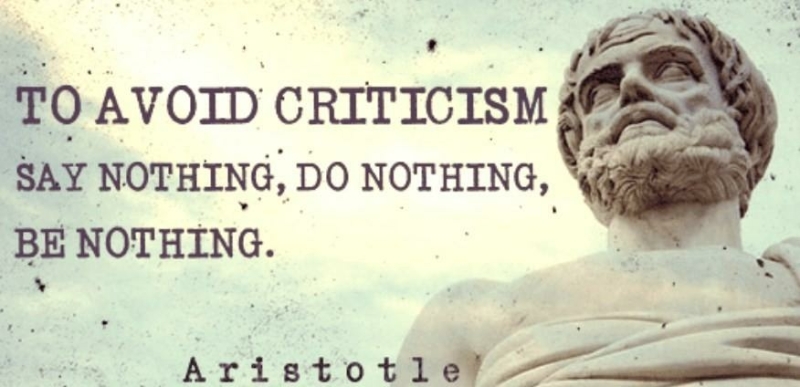
Now the only way to avoid any type of opinion is to do nothing, say nothing, and be nothing.
So it’s not a question of how to avoid opinions, but how to deal with them!
Now I already wrote an article on how to deal with destructive criticism, which you can find here:
But how to deal with the other one?
How To Deal With Constructive Criticism?
When we’re not dealing well with destructive criticism, it gives our brain a disempowering reaction:
The stressors are rising, pulling up anger or anxiety, and releasing the stress hormone cortisol, which is nature’s built-in alarm system.
Now some riders do not only react like this when they receive negative opinions from “haters” and “trolls”.
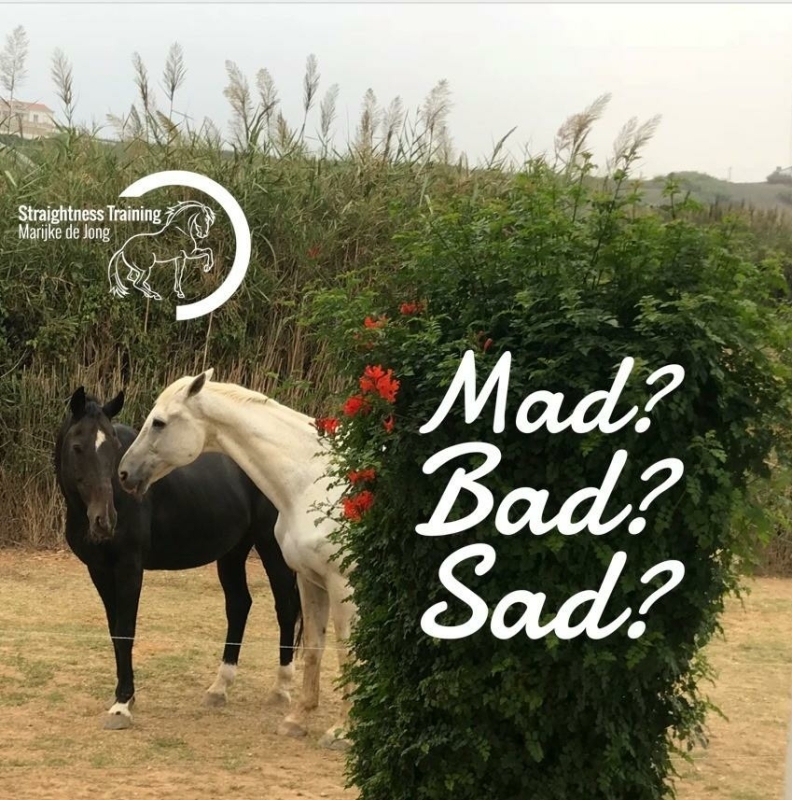
They also start feeling bad, mad or sad even when the criticism is constructive and intended to be helpful!
So they do not only feel upset about destructive criticism, but also about constructive feedback from other riders and instructors!
They react with defensiveness, and that’s a shame, as constructive criticism has a lot of benefits:
- It helps us learn new skills and improve already learned ones.
- It helps us realize if we’re doing something too much, too often, too long, sudden, or in a steady way.
- Or if our horse moves too high, too low, too quick, too slow.
- It helps us to check and change our approach.
- And to make better decisions to increase our performance.
- Plus, it’s a major key to constant and never-ending improvement (CANI).
But what is considered encouragement in the ears of a small child is sometimes crippling for adults.
And one of the main reasons riders feel crippled by constructive criticism is because they overvalue positive opinions.
And that’s the first of 9 strategies to avoid paralyzing feelings:
1. Stop Overvaluing Compliments
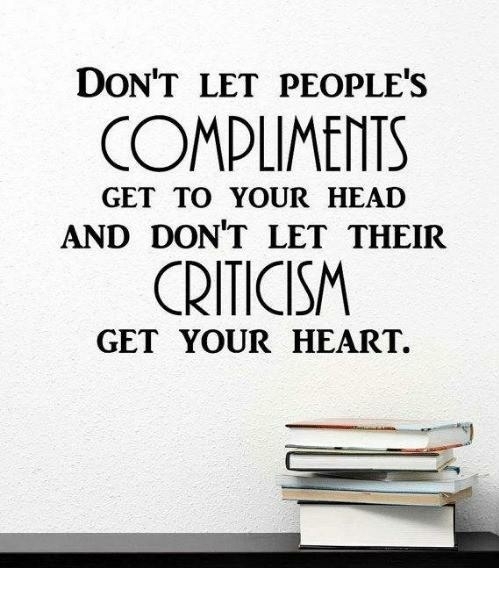
If you want to get better at dealing with negative opinions – both destructive and constructive – it’s quite simple:
- Stop overvaluing the opposite!
Remember:
Compliments and criticism are two sides of the same coin:
That means, if we are more or less sensitive to compliments, inevitably we will be more or less sensitive to criticism.
So if compliments mean a LOT to you, that should ring a bell.
Of course, we all need approval and positive input from people who know us and want to encourage the good things they see. It’s part of how we learn as it helps us to figure out what’s working and what we’re doing right.
Also, positive feedback significantly impact memory and motivation:
- When our brain associates the positive feeling with newly learned material, we tend to remember those materials a lot better.
- When we receive praise for something we have done, it is a signal to our brain saying “do it again”.
And as children, we are a sort of programmed to please our parents because it ensures our survival. Also, as adults, we look for approval of our family, friends, the group, our instructors, the work environment, our boss – just to assure we belong and are connected.
So the value of compliments is not the issue here:
- It’s the OVERvaluing of compliments.
A common reason riders struggle with criticism is because they OVERvalue compliments.
And when they OVERvalue other people’s praise, it might be a sign that they’re addicted to the “positive”.
2. Avoid Addiction To Positive Opinions
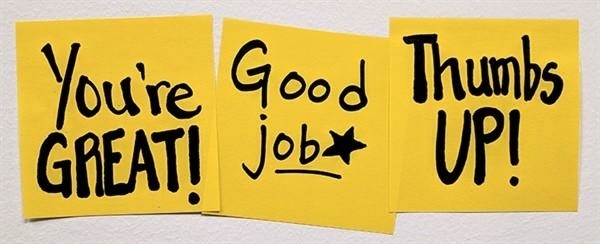
Compliments are powerful as they have the ability to change the fabric of our brains. Praise activates the reward circuit in our brain and the neurotransmitter “dopamine” is released.
So when we receive praise, we are experiencing a good feeling because of a pulse of dopamine, and this is something our brain wants to experience again.
As a result, we become encouraged and more willing to do it again and repeat the same task to be able to feel that rewarding ‘”high” again.
Now when people receive a lot of support in the form of compliments and acknowledgment, they can get accustomed to the pulses of “feel-good”. The pulses become a normal part of their being, they need them to maintain their brain chemistry, and they can get a sort of “addicted”:
- To people telling them they’re talented.
- To friends and peers telling them they’re beautiful.
- To parents and older siblings telling them they are proud of them.
- To teachers telling they are a good student.
- To instructors telling them they are good at training horses.
Of course, everyone likes a slap in the back but some students get to the point where they wait for slap in the back – deserved or undeserved – to get moving.
No cheering? No moving.
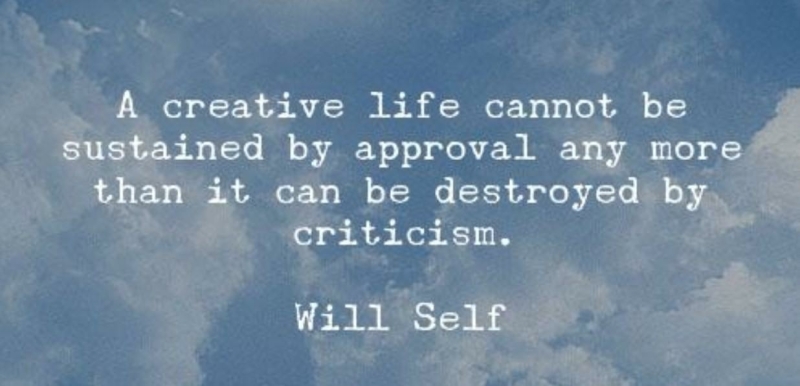
Positive, encouraging input is okay, but once we need it from the outside-in to start and keep moving, we’re trapped.
Then, the moment we don’t get it, we tend to stop.
No likes ? No loves ? No wows ? We are deprived of dopamine – we feel terrible.
We quit.
Just because we are addicted to the positive reinforcement.
But the solution is simple:
Once we learn how to not overvalue somebody who’s praising, liking, loving, wowing us, is the second we go down the path of dealing with criticism – both constructive and destructive.
In other words:
3. Quit Looking For Outside Validation
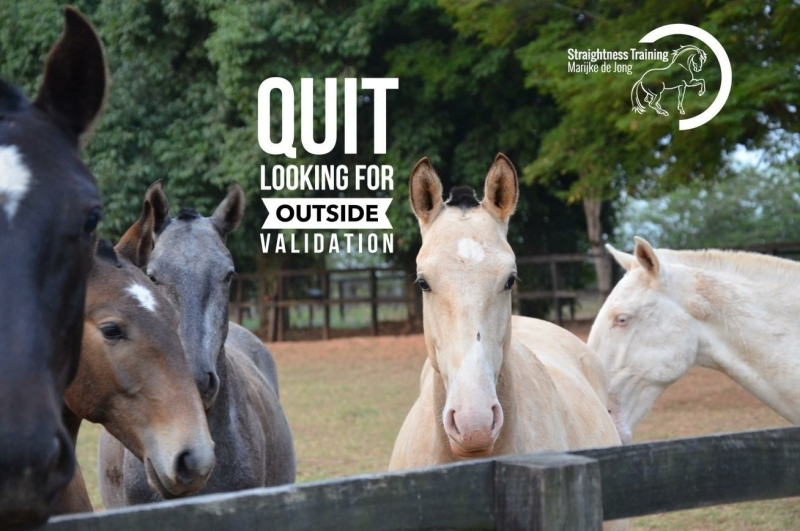
This is a key that unlocks so many chains in riders!
If you are going to overvalue any opinion, let it be your opinion of yourself!
Of course, it can be awesome to hear all the good things, to hear the applause, the get the approval, the likes, the loves, the wows.
But when it’s not there, you still have to feel good about yourself and appreciate what you created.
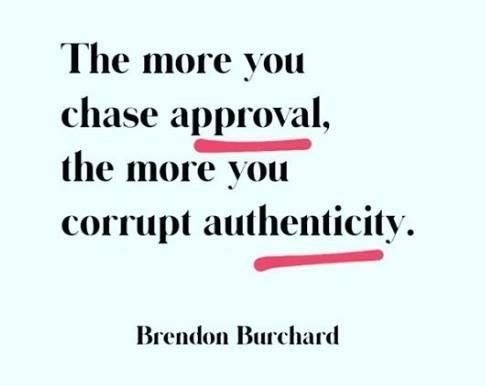
People want so much to be cheered on, but don’t let that need steal your self-confidence and authenticity.
Support from others is not needed for you to make progress!
Outside-in approval, and encouragement, and accolades are not necessary to feel good.
None of that is required for you to wake up and work and learn and try and do over and over.
Do your thing anyway!
Needing validation and positive reinforcement from the outside-in can be dangerous to your confidence.
Therefore, let that positivity come from the inside-out!
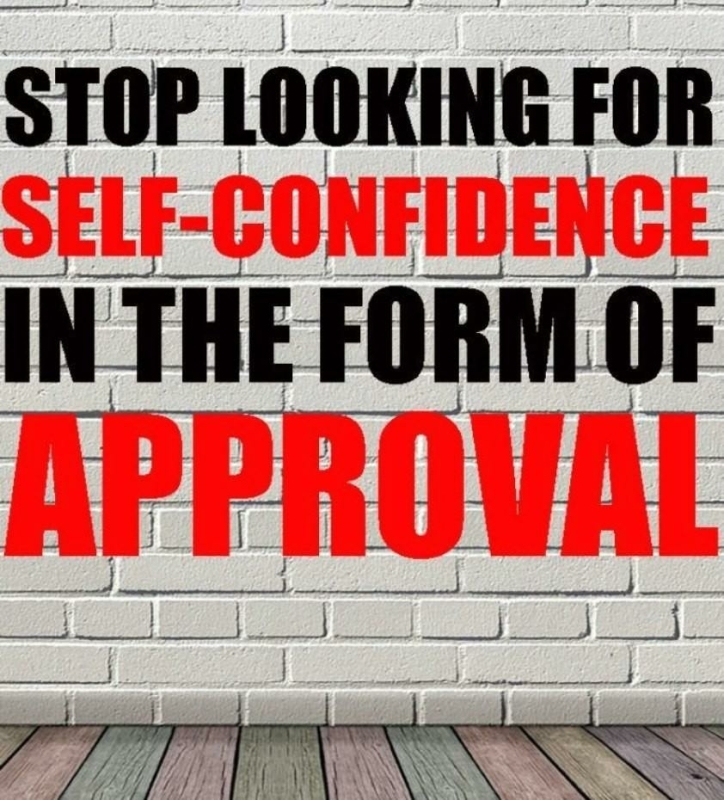
Stop overvaluing the cheering.
Stop looking for approval.
Stop craving for likes, loves, and wows.
Recognize how sweet it is to succeed on your own terms!
Don’t value anybody’s opinion more than you value your opinion about yourself!
When your intent is pure and comes from a good place, then trust it, and be grounded in it.
Being confident in your own decisions and actions regardless of what other people say or do or click or tap is one of your major success strategies!
4. Don’t Settle For “Feel Good” Lessons
Not only students, but also instructors can overvalue compliments.
But if an instructor compliments you on every little improvement you make while learning a new skill? Would you not start to feel a bit belittled? That perhaps the instructor didn’t really think you could do it?
What about when you do something that seems pretty easy and your instructor makes it into a big deal?
What about when you’re figuring out something challenging and your instructors congratulates you on every step (and misstep) along the way? Would it not disturb your flow as you work through the challenge constantly being interrupted while you are trying to figure it out?
And no doubt that you can feel it when an instructor give compliments or encouragement on autopilot or for something you’ve already mastered. It’s doesn’t feel meaningful!
So timing and dosing is key when it comes effective compliments.
And be aware of “green” instructors who value love and connection over growth and rely solely on praise in their teachings. They might be caught in the “praise for love” trap: Those instructors would rather say nice things, rather than risk the loss of love by telling their students that they did poorly. They don’t give riders honest and appropriate feedback, and as a result, those riders will continue to train their horse under a wrong assumption about their abilities – which might be potentially damaging!
So think about this:
- If you have a bad hair day, do you want to be told that you look good?
- Would you want to enter a talent contest because your so-called friends told you that we had some talent? Or would you rather find out that you don’t on national television?
- If you did something poorly to your horse, would you rather hear praise for how wonderful you are, or be told you need to work on it some more?
- If the way you ride your horse is creating an underneck, would you rather receive a compliment, or get some tips so you can change the way you use your reins?
- If you’re producing a “look-a-like”, would you rather receive a lot of “wows” and “loves”, or get feedback on how to get it done in way that it’s healthy for your horse?
- If something essential is missing in your fundament, would you rather graduate while the evaluator is turning a blind eye, or get the advice to widen, broaden and deepen the foundation so you can stay out of trouble in collection in the higher grades?
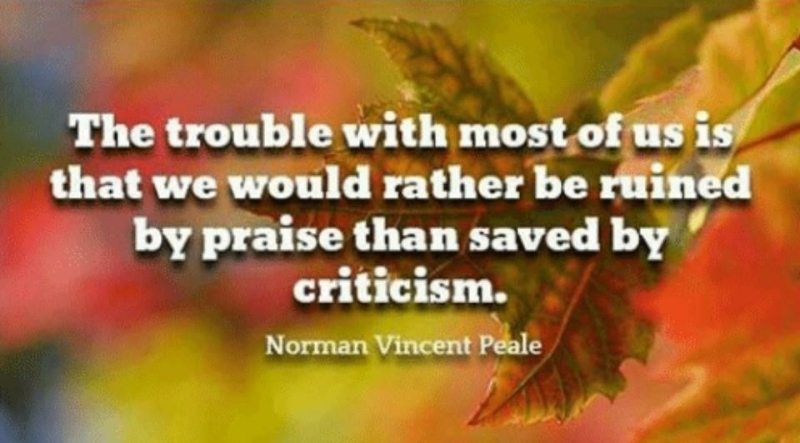
No doubt that you realize that constructive criticism will help you become a better horse trainer, though some riders try to avoid it when possible, and seek out praise instead.
But with our ears ringing with applause, we cannot think about improvement.
As a result, mediocrity becomes the norm, and so we are ruined.
Too many compliments and protecting students from criticism are not going to help in the long run.
By giving “feel good” lessons, and sugar coating advice, and fluffing up their “worth”, or their “skills”, or their “value”, for sure, it will keep students comfortable.
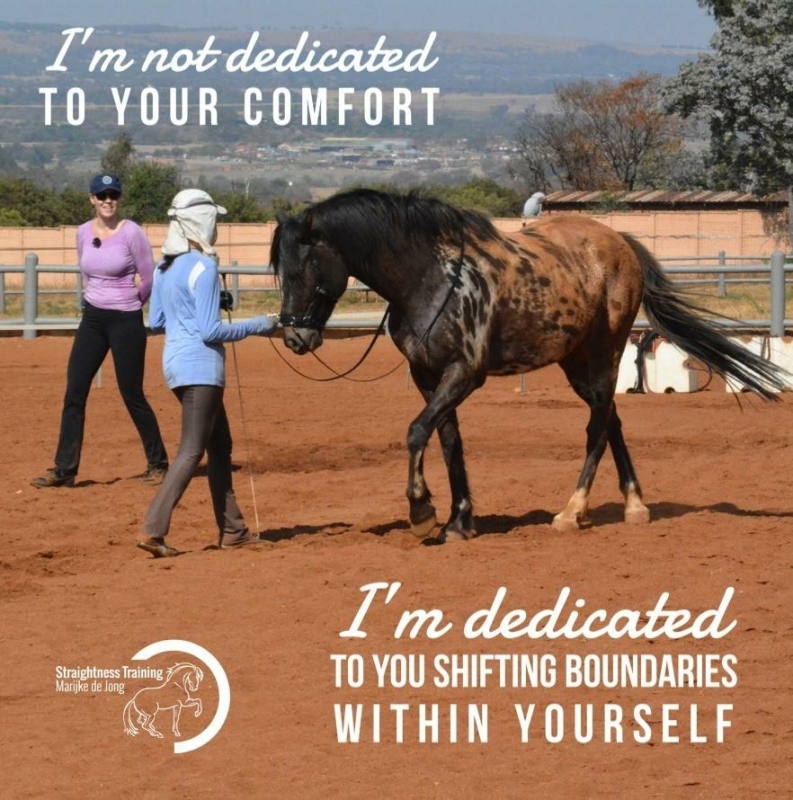
But they won’t learn, improve, grow, progress, develop or make a positive difference for their horse.
Because it’s outside the comfort zone where the learning takes place.
Only in the stretch zone, an instructor can help us to shift boundaries within ourselves so we can become a better horse trainer!
To get better, we need to know that we have areas where we need to improve.
The sooner we know, the sooner we can change our approach.
To not ruin ourselves and our horses we need to kill the monster when it’s little – and the best time to handle a “bad habit” is when we first begin to develop it, as it’s much more difficult to interrupt a pattern once it’s full-blown.
It’s logical, intelligent, and practical feedback of instructors that we thrive on on our personal path to mastery!
We need constructive criticism to shift our boundaries and become an efficient and effective horse trainer.
5. Avoid The Extreme, Stay In Green
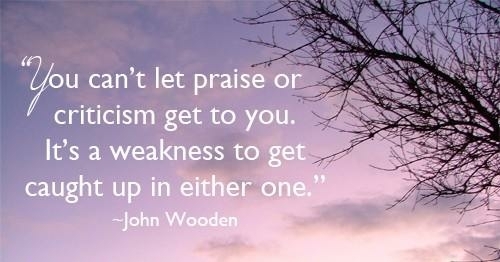
“Value” is not the issue, it’s the “OVERvalue” that causes problems.
When it comes to riding, we all need affirmation and positive input from instructors who encourage the good things they see, but if we OVERvalue our instructor’s or evaluator’s words and opinions, we might get caught.
The moment we get caught is when we get too high on compliments and too low on criticism:
- If an instructor tells us how good and wonderful we are, we’re on a high.
- If an instructor tells us otherwise, we will crash.
Some riders crave compliments but they hate feedback.
They feel glad when they receive stars and stripes or a nice score, but feel bad, mad or sad when it’s a low score.
But only telling someone they are amazing distorts their sense of reality just like only telling they are poor-performing.
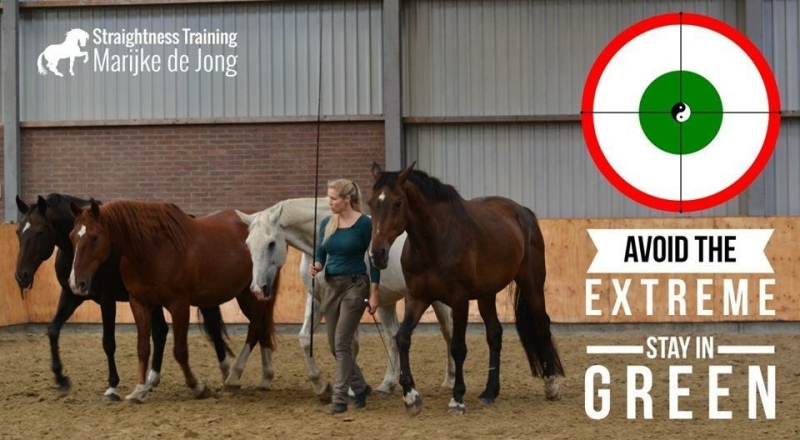
Supportive and encouraging statements should not only be positive or negative, there should be a centered “green” balance.
Extremes always end with a lack of long-lasting results.
Everything we do too much, too long, too often or in an isolated way ends up in the extreme – in “red” so the nuance is in the word “OVERvalue”.
The value of compliments and criticism live in the balanced “green”,
It’s like playing the hot-cold game, where you hide an object and give feedback to the “Sherlock Holmes” that they are moving away from the hidden object by saying “cold(er)” and you say “hot(ter)” when they are close to the object.
In Straightness Training, we use this approach both with our horses and our students to increase their “figuring out state” in the learning process.
So when you get feedback:
- Use positive feedback to know you’re on track, and use it as valuable reinforcement to create good habits, not to boost your ego.
- Use negative feedback to know you’re off track, and use it as fuel to become a better horse trainer, not to become a victim of it.
When it comes to the hot-cold game, we should not crave reinforcement and avoid to be redirected – that would be playing the hot-cold game without using the valuable opportunity of giving information when we are “cold” and off track.
Giving only compliments deprives us of at least half the valuable information!
So we need both!
Just respect both equally.
Which means, don’t overvalue either.
6. Recognize Pure Intentions
When the feedack is in balance and you get both “tops” and “tips” to improve your work, then take a minute to recognize the pure intentions of the people who are offering you feedback.
Instructors, evaluators, and STudy buddies genuinely want to give you useful input and help you to improve.
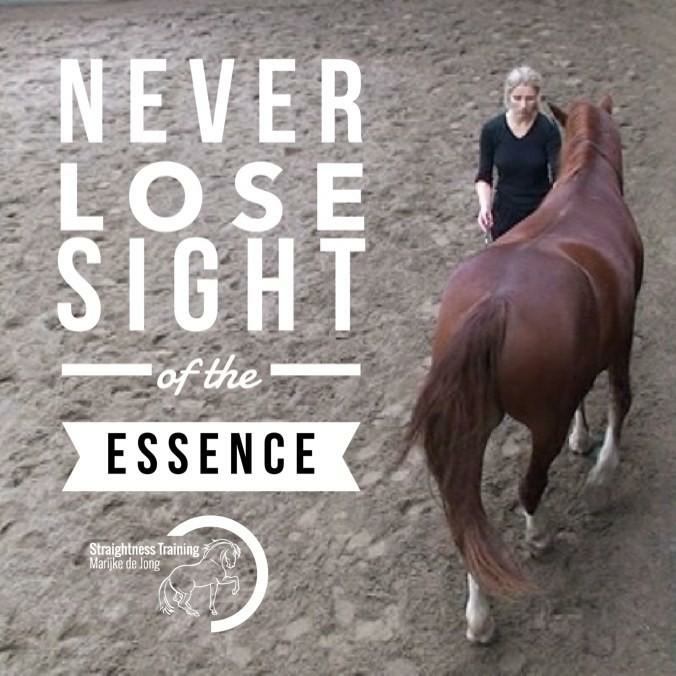
They are not out to get you, there only there to help you find the true essence when it comes to training your horse.
And, that’s far better than the alternative of people who cheer you on and nod along enthusiastically as you produce mediocre work.
So go ahead, and implement some of the tips, advice and suggestions you receive.
That person took quality-time out of his or her day in the interest and with the pure intention of helping you improve.
No matter how challenging constructive criticism can be to hear, there’s no denying the fact that it’s an amazing chance for you to learn, grow, and improve.
You’re sure to discover some valuable 2mm that you can integrate in your work for the benefit of your horse!
7. Anticipate and Accept Feedback
Your personal path is not about success or failures, it’s about contributing to the well-being of your horse the best you can.
It’s about creating the best possible results for the benefit of your horse.
To do so, you need feedback, there is no way out.
So anticipation is power:
- Anticipate that feedback will always be there to help you move forward on your personal path to Mastery.
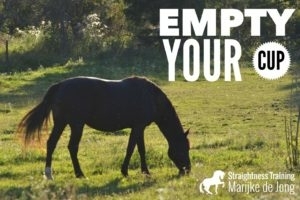
And acceptance is power:
- Receive the feedback with an open mind, a smile, and a positive attitude.
When you get feedback, have a pen and notepad handy to write down anything important.
Seek full to understand the feedback by questioning, for example, ask yourself:
- Where am I on track?
- Where am I off track?
- In what way do I do what I do?
- What’s the good in this?
- What can I learn here?
- How can I improve it?
- How can I change my approach?
- What should I do or change to get the result I want?
- What can I read?
- If I don’t change, what will be the short-term effect on my horse?
- If I don’t change, what will be the long-term effect?
When you really accept the fact that you’re going to get feedback, you can anticipate and learn how you should deal with it.
8. Stay Centered
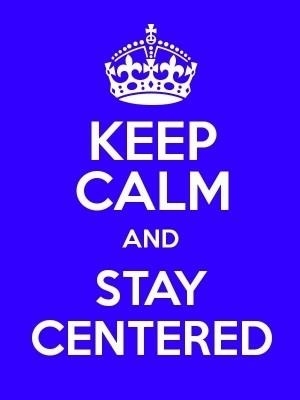
When you expect feedback and realize that feedback always happens, then you can use it to become a better horse trainer, instead of feeling rejected by it and react like a victim.
If you’re not going to anticipate feedback, you might going to fear it:
- You worry and hope that it’s full of compliments and praise that you’re doing wonderful, so you can go on cloud 9.
- However, when you are told what you need to improve and get other constructive feedback, it throws you off.
But why would you let feedback control your feelings?
Why would you let any type of feedback move your center?
- Don’t let the positive feedback move your center!
- And don’t let the negative feedback move your center!
We all know that it takes time, effort, and persistence to built the level of foundation to get from being a novice to reaching mastery, and that developing new skills is never free of trouble.
In the learning process, we all know when we are in that challenging stage of not being quite as good.
So the reason you might not be receiving compliments when you want to is just because you simply haven’t found what needs to be found – your instructor knows you are not ready for it.
Or perhaps your evaluators need to see you implementing that final 2mm detail so you can take that next big leap in your growth and development – they are waiting for you to make it happen.
So keep calm, stay centered, and just keep widening, broadening and deepening your ST Pyramid.
9. Take Responsibility
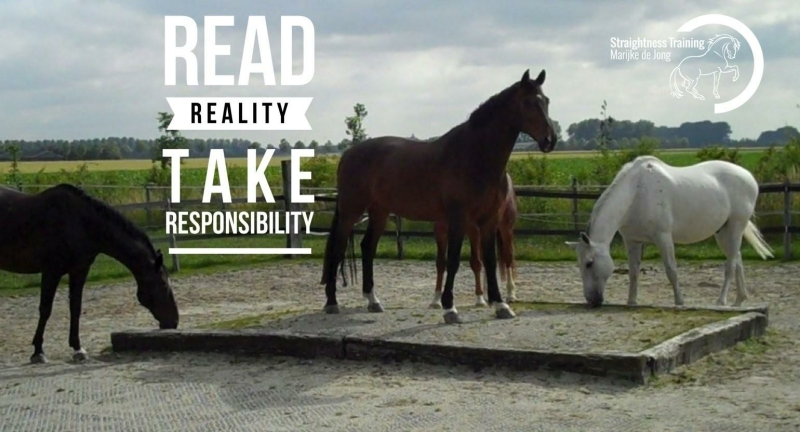
Take hands-on lessons, submit online lessons, get additional coaching, and get feedback.
Then choose how to respond to that feedback.
You cannot change the feedback, but you can always change your reaction to it.
No matter what feedback, you always have the freedom of mind to choose how you experience and interpret it.
What you make out of it is one hundred percent up to you:
- You can make “positive” feedback better than it is.
- You can make “negative” feedback worse than it is.
- or you can just see it as it is: as valuable feedback to let you know where you are on track and off track.
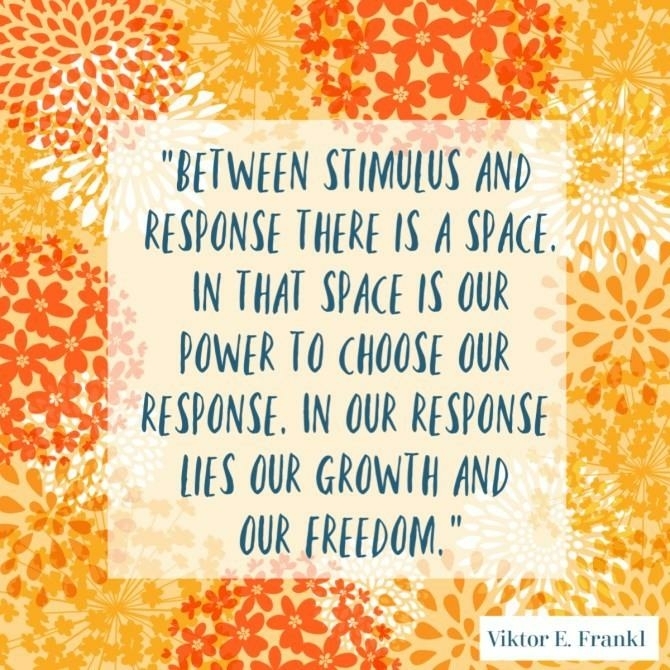
Responsiblity is about having the ability to respond instead of being reactive.
The key is not to react as an addict of positive opinions or a victim of negative feedback.
Remember that no one can make you feel glad, bad, mad, or sad without your consent.
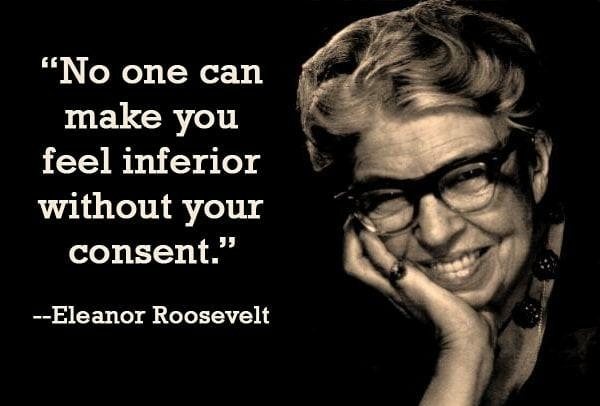
Use these 9 STrategies, and you’re sure to use constructive feedback to your advantage!

